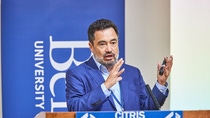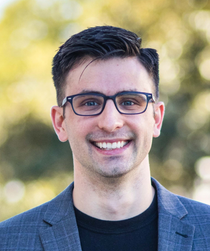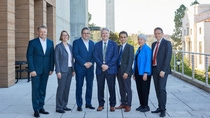Media
CARA: a decade of powerful bonds and breakthroughs
The California Research Alliance (CARA) began in 2014 as a way to unite BASF experts with researchers from leading West Coast universities. In the last 10 years, the network has expanded and achieved remarkable success.

This year, the California Research Alliance (CARA) – an initiative born at BASF to connect experts with researchers from some of the most innovative and prestigious universities in the United States to solve challenging global problems – celebrates its 10th anniversary.
Learn more about the accomplishments and novel solutions developed by the CARA network below.
A scientific hub for novel solutions
Since being launched in 2014, the multidisciplinary research network headquartered at the University of California, Berkeley (UC Berkeley) College of Chemistry, has produced over 110 research projects and 47 patent applications.
Among the many successful research projects fostered by CARA is a new catalyst in the VOCatTM family developed in collaboration with Professor Matteo Cargnello of Stanford University, which is now produced by BASF’s Chemical Catalysts business.
Sustainable chemical operations require effective and reliable destruction of volatile organic compounds (VOC) such as propane. With more than 20 years of successful application, BASF’s VOCatTM technology has proven its applicability in this field.
A two-year CARA collaboration laid the ground for the development of the new VOCatTM 380P, which is not only 50% more effective at removing propane emissions than its predecessor, VOCatTM 300S, but also provides 40% greater fresh catalytic activity. This new catalyst can help clients secure their environmental compliance and license to operate, and control emissions in a cost-effective way.
“The technical collaboration with CARA has been a remarkable and productive journey. It not only incubated VOCatTM 380P, the newest addition to our industry-leading VOCatTM technology platform but also sped up the innovation introduction to the market. I appreciate CARA’s unparalleled creativity and openness which has helped VOCatTM continue to be the premium sustainability solution to the chemical industry,” explains Dr. Yi Liu, Technology Manager.

Professor Javier Read de Alaniz from the University of California, Santa Barbara presents at the CARA 10 Year Anniversary Symposium.
Another great example of the impact CARA has had during its tenure is the development of adhesives that offer improved recyclability and degradability. Pressure-sensitive adhesives (PSAs) based on polyacrylate chemistry are widely used in industries such as packaging and printing. The process of making these polymers is relatively simple and is compatible with industrial-scale manufacturing, but the resulting carbon-carbon bonds in the polymers render these materials non-degradable.
Yet, the partnership between BASF and the University of California, Santa Barbara (UCSB), led by Dr. Matthias Gerst and Professor Chris Bates, was able to find a novel solution to create degradable and recyclable polyacrylates PSAs by incorporating α-lipoic acid, a natural antioxidant. This project was recently highlighted by UCSB Professor Javier Read de Alaniz and CARA Manager Dr. Rohini Gupta during the CARA 10-year celebration ceremony.
Dr. Bernd Reck, Vice President - Head of Research Platform Polymer Colloid Technology for BASF’s Dispersions and Resins business, trusted Gerst’s vision and supported this project. “In many applications for our acrylic polymer dispersions, there is a strong market demand for biodegradability. The unique chemistry explored in this collaboration project with UCSB offered a good chance to introduce breakable bonds into the otherwise extremely durable polyacrylate backbone,” he explains.

Nicholas Sherck, Computational Chemist, came to BASF from USCB.
A gateway to exceptional talent
In the last 10 years, CARA has engaged in research projects with 11 universities, over 80 faculty members, as well as 169 students.
In this environment, it is not uncommon for researchers to move from academia to corporate research. It provides an opportunity to learn the know-how and gain industry experience while also helping to improve product performance.
These opportunities become even more tangible when researchers take part in projects from strategic alliances such as CARA. In fact, in the past 10 years, 11 postdoctoral researchers have been hired from the CARA network and joined BASF. This is the case of Nicholas Sherck, who joined the company in 2021 from the University of California, Santa Barbara.
Sherck was hired to join the Digitalization of Research & Development unit in North America as a Computational Chemist and was recently promoted to a senior role after an important patent filing on a specific technology for BASF.
“My transition into BASF was remarkably easy due to multiple interactions with BASF through CARA, an internship, the North America Research Forum, and the international summer course. I already felt at home having an established network and having experience with BASF formulations,” explains Sherck.
A key milestone
In the past 10 years of collaboration, In the past 10 years of collaboration, BASF’s California Research Alliance (CARA) and the University of California, Berkeley (UC Berkeley) have produced more than 90 publications focused on novel materials and their applications, as well as biosciences and digitalization.
In honor of CARA’s 10-year anniversary, BASF hosted a symposium where scientists, researchers and government representatives discussed the challenges the chemical industry and society as a whole face today and how they can be resolved.
The network, which initially began with four universities, has almost tripled its reach, now including 11 universities across the West Coast, including the University of California, Irvine as well as Stanford University, the California Institute of Technology, and the University of Southern California, further strengthening the bonds between academia and industry.

From left to right, are Dr. Benjamin Knudsen, Vice President of Research North America, BASF Corporation; Dr. Kerstin Schierle-Arndt, Vice President Research Inorganic Materials and Synthesis and Associate Director of CARA, BASF SE; Dr. Helmut Winterling, President of Group Research, BASF SE; Prof. Doug Clark, College of Chemistry Dean, University of California – Berkeley; Prof. Peidong Yang, CARA Director, University of California – Berkeley; Carol Tecla Christ, Chancellor, University of California – Berkeley; and Dr. Josef Wünsch, Senior Vice President, Performance Materials, BASF SE.
In the words of Profesor Peidong Yang, CARA director at UC Berkeley, “CARA indeed represents an ideal model for effective industry-university collaboration. By closely interacting with our industrial partners, CARA researchers are delivering critical technological solutions by answering fundamental scientific questions. I look forward to the continued success of CARA for years to come.”
CARA is one of eight Academic Research Alliances at BASF, offering scientists from universities and research institutes from around the globe the opportunity to participate in close-to-practice research projects. Learn more about BASF’s academic collaborations.
Published on May 23, 2024 by Mariana Licio.
For media inquiries or to repurpose this article, please contact Lisa Brown.